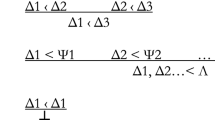Abstract
Non-naturalism—roughly the view that normative properties and facts are sui generis and incompatible with a purely scientific worldview—faces a difficult challenge with regard to explaining why it is that the normative features of things supervene on their natural features. More specifically: non-naturalists have trouble explaining the necessitation relations, whatever they are, that hold between the natural and the normative. My focus is on Stephanie Leary’s recent response to the challenge, which offers an attempted non-naturalism-friendly explanation for the supervenience of the normative on the natural by appealing to hybrid properties, the essences of which link them to both natural and sui generis normative properties in suitable ways. I argue that despite its ingenuity, Leary’s solution fails. This is so, I claim, because there are no hybrid properties of the sort that her suggestion appeals to. If non-naturalists are to deal with the supervenience challenge, they will have to find another way of doing so.
Similar content being viewed by others
Notes
In what follows, the source for all the quotations from Leary, as well as for the paraphrases of her views, is Leary forthcoming.
This problem, or something in its neighborhood, has been advanced by a number of philosophers (see, e.g., Dreier 1992; McPherson 2012). For non-naturalist responses, see, e.g., Shafer-Landau 2003, Enoch 2011, Scanlon 2014, Rosen. For criticisms of these responses, see, e.g., Dreier 2015; Leary forthcoming.
Actually, it is not entirely clear how exactly this is supposed to work. The mere fact that it is part of the essence of some property, G, that if something has the property G, it also has a certain other property, F, does not explain why G-facts ground F-facts. For example, it is plausibly part of the essence of being a bachelor, that if someone is a bachelor, then he is also unmarried. But this doesn’t explain why facts about bachelorhood would ground facts about being unmarried, as facts about bachelorhood do not ground facts about being unmarried. However, I set this issue to one side here.
Leary uses this as an example of a necessary relation between two seemingly quite different kinds of properties, which nevertheless is explainable. Krister Bykvist (in personal communication) has independently proposed this as a counter-example to my claims in this section.
References
Blackburn S (1998) Ruling passions. Oxford University Press, Oxford
Dreier J (1992) “The supervenience argument against moral realism”. South J Philos 30:13–38
Dreier J (2015) “Explaining the quasi-real”. In: Shafer-Landau R (ed) Oxford studies in metaethics, vol 10. Oxford University Press, Oxford
Dreier, J “Is there a supervenience problem for robust moral realism?”. (Manuscript)
Elstein D, Hurka T (2009) “From thick to thin: two moral reduction plans”. Can J Philos 39:515–535
Enoch D (2011) Taking morality seriously. Oxford University Press, New York
Fine K (1994) “Essence and modality”. Philos Perspect 8:1–16
Leary S, forthcoming. Non-naturalism and normative necessities. In: Shafer-Landau R (ed) Oxford studies in metaethics, Vol. 12. Oxford University Press, Oxford
McPherson T (2012) Ethical non-naturalism and the metaphysics of supervenience. In: Shafer-Landau R (ed) Oxford studies in metaethics, vol 7. Oxford University Press, Oxford
Olson J (2014) Moral error theory. Oxford University Press, Oxford
Parfit D (2011) On what matters, vol 2. Oxford University Press, Oxford
Ridge M (2007) “Anti-reductionism and supervenience”. J Moral Philos 4:330–348
Ridge M (2014) Impassioned belief. Oxford University Press, Oxford
Roberts D (2013) “Thick concepts”. Philos Compass 8:677–688
Roberts D “Why believe in normative supervenience?”. (Submitted)
Rosen G “What is normative necessity?”. (Manuscript)
Scanlon TM (2014) Being realistic about reasons. Oxford University Press, Oxford
Schroeder M (2007) Slaves of the passions. Oxford University Press, Oxford
Schroeder M (2014) “The price of supervenience,” in Explaining the reasons we share: explanation and expression in ethics, Volume 1. Oxford University Press, Oxford
Shafer-Landau R (2003) Moral realism: a defence. Oxford University Press, Oxford
Sturgeon N (2009) “Doubts about the supervenience of the evaluative”. In: Shafer-Landau R (ed) Oxford studies in metaethics, vol 4. Oxford University Press, Oxford
Väyrynen P (2013) The lewd, the rude and the nasty: a study of thick concepts in ethics. Oxford University Press, Oxford
Author information
Authors and Affiliations
Corresponding author
Additional information
I thank Stephanie Leary, the audiences at Stockholm and Uppsala (especially my commentators Olle Risberg and Daniel Fogal, as well as Jonas Olson, Anandi Hattiangadi, Krister Bykvist, and Matti Eklund), the Helsinki metaethics reading group, and a bunch of Helsinki colleagues for helpful feedback. The funding for this work was provided by the Academy of Finland.
Rights and permissions
About this article
Cite this article
Toppinen, T. Essentially Grounded Non-Naturalism and Normative Supervenience. Topoi 37, 645–653 (2018). https://doi.org/10.1007/s11245-017-9456-x
Published:
Issue Date:
DOI: https://doi.org/10.1007/s11245-017-9456-x



